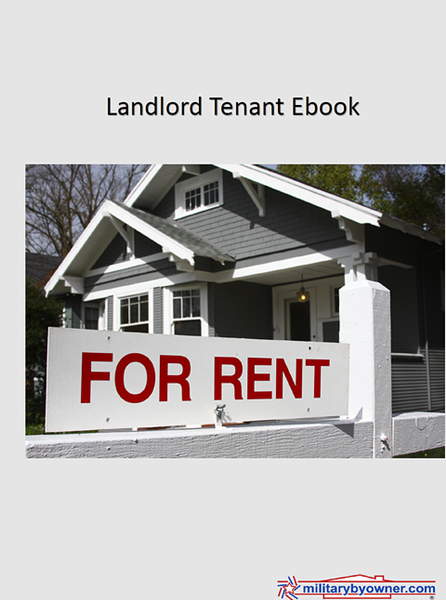.png)
There aren’t many people comfortable saying they have enough when it comes to financial planning for the future or indulging in life’s experiences. We’re all looking for ways to grow our wealth.
But the military makes that a bit challenging at times. Military careers are often stable, but they’re demanding. They don’t leave much time on your calendar to work a second job and create additional income. Plus, it can be incredibly difficult for a military spouse to contribute. With PCS moves on the horizon every couple of years, a substantial second income is a far-off dream for some.
Why invest in real estate?
When your time is limited, you need an investment that functions primarily on its own.
It’s passive. You need a passive income. One that grows your money without making you run all over the place to make it happen. That’s real estate.
It’s tangible. While there are other investments you can funnel your money into, real estate is tangible. And because of that, it allows you more control than if you were to invest in the stock market. Not only can you physically see your money in action, but you can improve it. You can increase its value and directly affect the monthly amount you take home.
It’s relatively low risk. Any investment comes with risk. But the amount of control you have in real estate supports the idea that it’s less risky than investing in the stock market. In 5 Reasons Why Real Estate is a Great Investment, James Harris shares that,
"History continues to prove that the longer you hold onto your real estate, the more money you will make. The housing market has always recovered from past bubbles that caused home appreciation to slip. Prices have returned to normal for those who held on to their investments during those uncertain times, and appreciation is back on track."
Is real estate the right investment for you?
“There’s no sense in jeopardizing your finances by adding debt to more debt. So if you’re considering buying a home solely as an investment property (with no intention of living there yourself), it’s probably best to wait until after you’ve paid off other debt.” — Is a Rental Property the Right Investment for You?
But, if your debts are paid, you have money is set aside for retirement each month, a solid emergency fund in place, and a college fund for your kiddo, then diving in real estate might be the perfect step forward!
Considering a Real Estate Investment Property? Here’s What You Need to Know if You’re a Military Member
Your military career is an asset. The fact that you’re military is a huge asset when investing in real estate. Although it often means you’re managing a property from afar, undeniable benefits exist.

You already know the area.
"Military members benefit from many PCS moves to understand real estate at each duty station. If landlording is their ‘thing,’ then previous geographical knowledge of multiple locations courtesy of the U.S. Government puts them in a better position to become a long distance landlord simply by absorbing and understanding their daily lives." — Dawn M. Smith, What Long Distance Landlords Need to Know
You’re familiar with the market. You know the community if you’re investing at your current duty station or a former one. There’s probably a large number of military in the area, which makes you and your property attractive on the market and provides you the security that your investment won’t sit vacant.
You know the local businesses. No one can manage a property on their own. Even if you’re staying local, there are times you’ll need to call for backup. The ability to establish relationships with local service companies like handymen, HVAC guys, and plumbers will help alleviate your stress when things inevitably go wrong.
You have access to excellent financing options. Your military status gives you access to financing options that make jumping into a real estate investment more feasible.
Before you assume which option is best for you, take the time to research which home financing option (and lender!) is the best fit for you, such as:
- VA Loan
- USDA Loan
- FHA Loan
- Conventional Home Loan
Related: Home Financing Options for Military & Home Buyers
Budgeting Is Everything When It Comes to Real Estate Investing
You know that real estate is not a cheap investment. It can potentially bring in additional monthly income for a long time, but it requires tearing a few checks from your checkbook to get there.

“Keep your emotions out of it and analyze your numbers. If the numbers make sense, execute.” — Kevin Brenner, Head Coach, Operation Atom at Active Duty Passive Income (ADPI).
Down payment. While you might get away with 3-5% down on a property you intend to live in, lenders typically require 20% for rental property investments. NerdWallet helps us understand why.
“Lenders consider investment and rental property loans riskier than typical home mortgages. It's mainly because it’s not your primary residence; it’s a business transaction rather than a home purchase.”
Interest rates. Since the lenders assume more risk, they’ll also likely require higher interest rates and an increased down payment. You’ll want to check with your lender for an accurate quote as you create your budget.
Insurance. Homeowners insurance alone isn’t enough to cover a rental property. While landlords’ insurance policies and the standard homeowners’ insurance overlap, rental property insurance goes beyond to account for the added risk of tenants.
- Dwelling coverage. Protects the physical property.
- Landlord’s personal property. This protects the items you leave on site. It doesn’t cover any of the tenant’s personal property.
- Liability. Protects you should a tenant or anyone else be injured on your property
- Loss of rent. It protects you should you see a loss of rental income or if it becomes uninhabitable due to a covered disaster.
Maintenance costs.
“Although maintenance costs will differ from every property, it’s imperative that investors maintain adequate funds for monthly costs related to the rental property.” — Estimating Expenses for Your Rental Property
A few things to consider:
- Repairs to the HVAC, roofing, plumbing, and appliances.
- Landscaping.
- HOA fees.
- Pest control.
- Cleaning costs.
Utilities. You can expect the tenants to cover most of the utilities, but there might be a few left for you to pay each month, like water or trash pickup. Tenants will most often pay the gas, electricity, and internet/cable bills.
Emergency fund. In addition to sustaining your real estate investment, you must pay for your own cost of living. This shouldn’t be a problem if your property has a tenant who pays rent each month. But what if it sits empty?
When you’re a military member PCS’ing here and there, this question creates more stress for you than it does for the average landlord.
Let’s say you live in Hawaii and decide to invest in a rental property on the island. Your BAH in Hawaii is higher than most other duty stations. Then, you get PCS orders to Oklahoma, where the BAH is much lower. Assuming your Hawaii rental property never sees a gap between tenants, there's no issue. But what if there is? Can you afford to pay your current cost of living in Oklahoma and the expenses of your Hawaii rental property?
Carefully considering the location of your rental property will help minimize your stress — as will an emergency fund with a few months’ expenses secured just in case your rental gets a break in tenancy.
Property manager. If you choose to hire a property manager, then it’s important to factor their fees into your budget. Most managers charge between 4 and 10% of the monthly rent.

There Is Such a Thing as the Right Property
The sweet thing about investing in real estate is that you know exactly where your money is going. You’re not crossing your fingers hoping for the best as you send money into a black hole called “real estate.” You get to carefully select the property you want to financially support. So it’s important to research and take the time to find the property most likely to be profitable.
If you’re investing near a military installation, then you already know what your target market wants.
Location. Military families often want a quick or easy commute to base. They’re most often looking for convenience to stores, restaurants, schools, and churches. A safe neighborhood and friendly community are high on the list, too.
While some will pursue homes outside city limits in search of a separation from work and home, many will choose convenience over privacy.
Cost. Obviously, the goal of an investment property is to make money. Look for a home that falls within your budget, but will also appeal to the average military family transferring to the area.
Amenities. Think average. Yes, everyone enjoys reaping the benefits of the latest technology. But are most going to pay through the nose to have every item on their wish list? Probably not. They’ll likely find something that meets their needs now and save the dreamy in-ground pool, gourmet kitchen, and double shower for their forever home later down the road. Instead, look for a property that appeals to the masses. A single family home with three bedrooms and two bathrooms is about as versatile as it gets.
Setting the Rental Price Is Key
The rental price determines your take-home each month. Remember all the budgeting you did earlier? How much income do you need to bring in each month to ensure that you’re swimming and not sinking? Calculating your property’s worth in the current housing market will help you figure out if the rent will cover your monthly expenses or if you can pocket a little each month.
But it’s important that you factor in more than just your personal finances and the current housing market when establishing rent.
If you plan to market to fellow military families, consider the BAH for the area and the average allowance for families coming in. With this information, you can target a property that falls well within your allowance and makes it attainable for potential tenants.
Making a Decision About Hiring a Property Manager
“The further a rental property is from your next duty station, the harder it is to manage... and the more you should consider hiring a property manager.” — 3 Things to Know Before You Hire a Property Manager
Hiring a property manager for your rental property will make your role as a landlord easier, but ultimately lessen your take-home each month. Your job is to decide whether hiring a property manager is worth the peace of mind.
Start by answering these questions:
1) What does a property manager do?
2) What is expected of you, the homeowner?
3) How does the property manager handle their practice?
Learn more about hiring a property manager.
Being a Good Landlord Takes Skill
Anyone can be a landlord, but not everyone can be a good landlord. Even with the assistance of the world’s best property manager, the landlord title comes with a heavy dose of responsibility.
Clear communication. Communication is the strongest tool you have as a landlord. Setting expectations helps tenants understand what you’re looking for, feel secure in the relationship, and come to you when necessary. It’s also important to recognize that people have different communication styles. Determining what works for you and your tenant early on will help avoid headaches caused by miscommunication.
Knowledge of the law. Know the Fair Housing Act. You might be familiar with it if you’ve rented before, but this piece of literature brings on a whole new meaning when you’re a homeowner.
From Understand the Fair Housing Act When Listing Your Property:
“In addition to avoiding any discriminatory behavior against the protected classes, homeowners are legally bound to uphold the same terms and conditions for each applicant. Homeowners cannot attach different qualifiers to a protected class applicant, for example, requiring a deposit for one set of renters, but not another.”
The ability to multitask. Whether you plan to handle the steps yourself or split the checklist with a property manager, there’s a lot to do to maintain your rental property.
- Prepare and list your home for rent.
- Find and screen tenants.
- Create the contract and have it signed.
- Conduct inspections.
- Coordinate repairs and maintenance.
- Organize finances.
- Keep detailed records.

Tips for Success as a Landlord
1. Don’t get emotional. A lot of people get wrapped up their emotions when buying a home. They think about all the memories they’ll make there and buy it for all the wrong reasons.
“Instead of trying to turn a home into an investment property, they should select an investment property where they can live for a few years. When they leave for their next duty station, they can rent out that property for a much better return on their investment.” — Doug Nordman, author of ‘The Military Guide To Financial Independence And Retirement’ and founder of The Military Guide.
2. Be patient. Since you aren’t stressing to put a roof over your head, take your time finding the right property to invest in. If you don’t feel good about it, don’t do it.
3. Have an exit strategy. You’ll find sources that say the longer you sit on real estate, the wealthier you’ll become. And that’s true. When you start building equity, your take-home increases. However, keeping a rental property forever might not be the best investment for your finances.
Kevin Brenner advises, “Ask yourself, is your money growing faster in equity than it would elsewhere?”
4. Build community. You’ve probably seen the benefit of networking before, and your real estate investment is no exception. Building relationships with local businesses can not only help you keep the maintenance costs down with discounted rates, but also give you peace of mind that your investment is in good hands when you’re not nearby.
5. Choose a low-maintenance property. Investopedia reminds us that,
“It’s tempting to look for the house that you can get at a bargain and flip into a rental property. However, if this is your first property, that’s probably a bad idea. Unless you have a contractor who does quality work on the cheap—or you’re skilled at large-scale home improvements—you’re likely to pay too much to renovate. Instead, look to buy a home that is priced below the market and needs only minor repairs.”
As you get further into real estate, the money maker is the “C” property located in an “A” or “B” neighborhood. Because, with only a few modifications, you can exponentially increase the property’s value.
5. Don’t forget about tax deductions. Rental income is taxable income. But it’s a business and the IRS treats it as such.
TurboTax breaks it down. Deductible expenses include, but are not limited to:
- Advertising
- Cleaning and maintenance
- Commissions
- Depreciation
- Homeowner association dues and condo fees
- Insurance premiums
- Interest expense
- Local property taxes
- Management fees
- Pest control
- Professional fees
- Rental of equipment
- Rents you paid to others
- Repairs
- Supplies
- Trash removal fees
- Travel expenses
- Utilities
- Yard maintenance
In addition to these, you can add travel to your list of deductions. If you’re a long distance landlord and travel back to check on the property, then your flight, gas money, etc. are part of your business expenses.
There’s no doubt about it, real estate investing is a great way to create passive income and grow your wealth. It’s overwhelming at first, with good reason. Not only is it a huge financial investment, but there’s a lot of information out there. But here’s hoping this information will help you find your footing and take the plunge into real estate investing.
Learn more about real estate investing:
Download MilitaryByOwner’s Landlord/Tenant Ebook:

By Danielle Keech